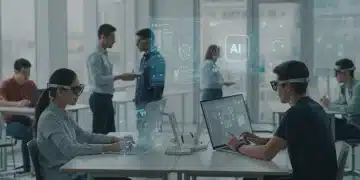Online course trends shaping the future of education

Online course trends highlight the importance of personalized learning and emerging technologies like AI and VR, transforming education by making it more engaging, flexible, and accessible for learners worldwide.
Online course trends are redefining how we approach learning today. With the increasing demand for flexible education options, these trends play a crucial role in shaping how knowledge is shared and acquired. Let’s delve into the latest developments and what they mean for learners and educators alike.
The rise of micro-credentials
The rise of micro-credentials has been significant in the evolving landscape of online education. These short, specialized programs allow learners to gain targeted skills quickly. Unlike traditional degrees, micro-credentials focus on specific job-related competencies, making learning more accessible and relevant.
What are micro-credentials?
Micro-credentials are digital certifications that showcase a learner’s proficiency in a particular skill or area. They can often be completed in a matter of weeks and focus on real-world applications.
Key benefits of micro-credentials
- Flexibility to learn at your own pace
- Cost-effective compared to traditional degrees
- Immediate applicability in the job market
- Verification of skills through digital badges
This approach not only caters to busy professionals but also provides opportunities for anyone seeking to upgrade their skills. Employers increasingly recognize micro-credentials as valid indicators of competence, allowing workers to showcase their knowledge in a competitive job market.
As the job landscape changes with technology and industry demands, micro-credentials are becoming an essential part of lifelong learning. They enable individuals to adapt quickly and stay relevant.
Examples of micro-credential programs
Numerous platforms now offer micro-credentials across various fields. Industry leaders like Coursera and edX provide courses in data science, digital marketing, and more. These offerings empower learners to pursue their interests without committing to a full degree.
The shift towards micro-credentials can also be seen in corporate training programs, where companies invest in tailored credentials that align with their specific needs. This trend reflects a broader movement toward skills-based hiring, where employers prioritize what candidates can do over formal qualifications.
Emerging technologies in online education

Emerging technologies in online education are reshaping the way we learn. The introduction of these technologies not only enhances the learning experience but also makes education more accessible to a wider audience.
Key technologies transforming online education
Several innovative technologies are making waves in the field of online education. Each brings unique features that help to engage learners in new ways.
- Artificial Intelligence: AI helps personalize learning experiences by analyzing students’ progress and suggesting resources tailored to their individual needs.
- Virtual Reality (VR): VR offers immersive experiences, allowing learners to explore complex subjects through virtual environments.
- Augmented Reality (AR): AR enhances learning by overlaying digital information onto the real world, making content more interactive.
- Learning Analytics: By collecting and analyzing data, educators can identify trends to improve courses and student outcomes.
These technologies motivate learners by creating engaging and interactive environments. With the help of AI and VR, students can dive deeply into subjects that interest them, gaining practical skills in a fun and dynamic way. This evolution supports a more learner-centered approach, where each individual can progress at their own pace and in their own style.
In addition, the incorporation of learning analytics allows for ongoing assessment that helps educators adjust their teaching methods. Customizing the educational experience based on these insights improves student engagement and retention.
The role of mobile technology
Mobile devices play a crucial role in making online education accessible anywhere. Students can learn on the go, which fits well with their busy lifestyles. This flexibility enables learners to manage their studies alongside work and personal commitments.
The integration of mobile applications in education is also a game-changer. These apps often include features like gamification, interactive quizzes, and discussion forums that encourage collaboration among learners.
Personalized learning experiences
Personalized learning experiences are becoming pivotal in online education. This approach tailors education to meet the unique needs of each learner, enabling them to thrive.
What is personalized learning?
Personalized learning adapts the educational experience based on the learner’s preferences, pace, and abilities. It focuses on individual goals and pathways rather than a one-size-fits-all curriculum.
Benefits of personalized learning
- Improved engagement: Learners are more motivated when the content is relevant to their interests.
- Self-paced learning: Students can progress at their own speed, allowing for deeper understanding.
- Targeted support: Personalized interventions help learners overcome specific challenges.
- Better outcomes: Customized pathways often lead to higher achievement and satisfaction.
This flexibility allows for tailored resources and assessments that cater to different learning styles. By leveraging technology, educators can analyze learners’ progress and adjust accordingly. For example, platforms may use algorithms to recommend study materials that align with a student’s strengths and weaknesses.
As a result, students feel empowered in their educational journeys, taking ownership of their learning. This method encourages critical thinking and problem-solving skills essential for the future.
Tools and strategies for personalization
Numerous tools support personalized learning experiences. Learning management systems (LMS) often include options for tracking progress and customizing coursework. Furthermore, gamification elements can introduce fun into learning while appealing to various preferences.
Teachers can also implement differentiated instruction, providing multiple paths for students to achieve learning goals. These strategies foster an inclusive environment where every learner has the opportunity to succeed in their way.
Future predictions for online courses

Future predictions for online courses suggest a vibrant and dynamic evolution in the education sector. As technology continues to advance, the landscape of learning will witness significant changes.
Trends shaping online education
Several trends are already impacting how online courses are delivered and experienced. These trends indicate a shift towards more immersive and flexible learning environments.
- Increased use of Artificial Intelligence: AI will play a crucial role in personalizing learning experiences and improving course recommendations.
- Growth of micro-learning: Short, focused modules will become more popular, allowing learners to pick up knowledge quickly.
- Integration of virtual and augmented reality: VR and AR will enhance engagement through immersive learning environments.
- Focus on soft skills: Online courses will increasingly address the need for emotional intelligence, teamwork, and communication skills.
These transformations will cater to diverse learning styles, making education more accessible. Students will benefit from greater flexibility and the ability to choose learning paths that align with their goals.
Additionally, as global connectivity improves, more learners from various backgrounds will participate in online education. This diversification will enrich course content and promote cultural exchange.
Anticipated changes in course structure
In the future, we can expect more collaborative and project-based courses. These approaches encourage teamwork and practical application of knowledge. As educators embrace new methods, learners will work alongside peers to solve real-world problems.
Moreover, the use of gamification patterns will create a more enjoyable learning atmosphere. Elements such as rewards, achievements, and challenges will motivate students to engage deeply with the course material.
Ultimately, the future of online courses looks promising. The combination of technology, personalized paths, and collaborative opportunities will create a rich educational experience that fosters lifelong learning.
In conclusion, the future of online courses is bright and promising. With the rise of personalized learning, advancements in technology, and an emphasis on essential skills, education is becoming more engaging and accessible. As educators embrace these changes, learners will enjoy flexible paths tailored to their needs. The incorporation of immersive experiences and community collaboration will enrich learning experiences and foster a culture of continuous growth. Embracing these trends will empower individuals and prepare them for a rapidly changing world.
\n
\n
FAQ – Frequently Asked Questions about Online Course Trends
What are micro-credentials?
Micro-credentials are short, focused courses that certify specific skills, providing a flexible way for learners to enhance their qualifications quickly.
How does personalized learning improve online education?
Personalized learning adapts to individual student needs, allowing them to learn at their own pace, increasing engagement and effectiveness.
What technologies are shaping the future of online courses?
Emerging technologies like AI, VR, and learning analytics are enhancing the online learning experience by providing tailored resources and interactive environments.
Why is community collaboration important in online courses?
Community collaboration fosters teamwork and problem-solving skills, helping students apply their knowledge in real-world scenarios and encouraging peer learning.





